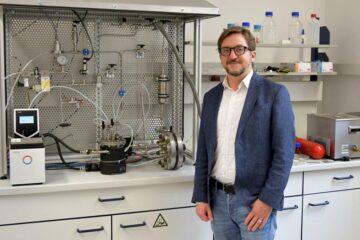C3bot peptides as drugs for the treatment of traumatic or degenerative neuronal injury

There is a strong need for drugs which induce neurites specifically – and, at the same time are suitable for long term application. Peptide fragments of the C3 exoenzyme of Clostridium botulinum have been found to have neuritogenic effects on neurons as well as regenerative properties in an animal model (mouse). The peptides represent promising drug candidates for the treatment of neurodegenerative disorders such as Morbus Alzheimer, Parkinson, Huntington chorea but also for spinal cord injury and traumatic brain injury.
Whereas a 26mer peptide stimulates both, dendritic and axonal growth, a 15mer peptide selectively promotes axonal growth. Therefore the 15mer may be the drug of choice, if regeneration in a complex network is demanded, when false synaptic contacts have to be avoided. Such conditions arise from traumatic brain injuries. Both, the 15mer and the 26mer peptide trigger a strong transient activation of RhoA which mimics the physiological conditions of RhoA activation / inactivation cycles. These properties make the peptides suitable for repeated administration and long term treatments. As the peptides only act on neurons and not on microglia or astrocytes, there is no risk for neuronal inflammation or glia scar formation.
Weitere Informationen: PDF
ipal GmbH
Tel.: +49 (0)30/2125-4820
Ansprechpartner
Dr. Dirk Dantz
Media Contact
Alle Nachrichten aus der Kategorie: Technologieangebote
Neueste Beiträge

Ideen für die Zukunft
TU Berlin präsentiert sich vom 22. bis 26. April 2024 mit neun Projekten auf der Hannover Messe 2024. Die HANNOVER MESSE gilt als die Weltleitmesse der Industrie. Ihr diesjähriger Schwerpunkt…

Peptide auf interstellarem Eis
Dass einfache Peptide auf kosmischen Staubkörnern entstehen können, wurde vom Forschungsteam um Dr. Serge Krasnokutski vom Astrophysikalischen Labor des Max-Planck-Instituts für Astronomie an der Universität Jena bereits gezeigt. Bisher ging…

Wasserstoff-Produktion in der heimischen Garage
Forschungsteam der Frankfurt UAS entwickelt Prototyp für Privathaushalte: Förderzusage vom Land Hessen für 2. Projektphase. Wasserstoff als Energieträger der Zukunft ist nicht frei verfügbar, sondern muss aufwendig hergestellt werden. Das…

















